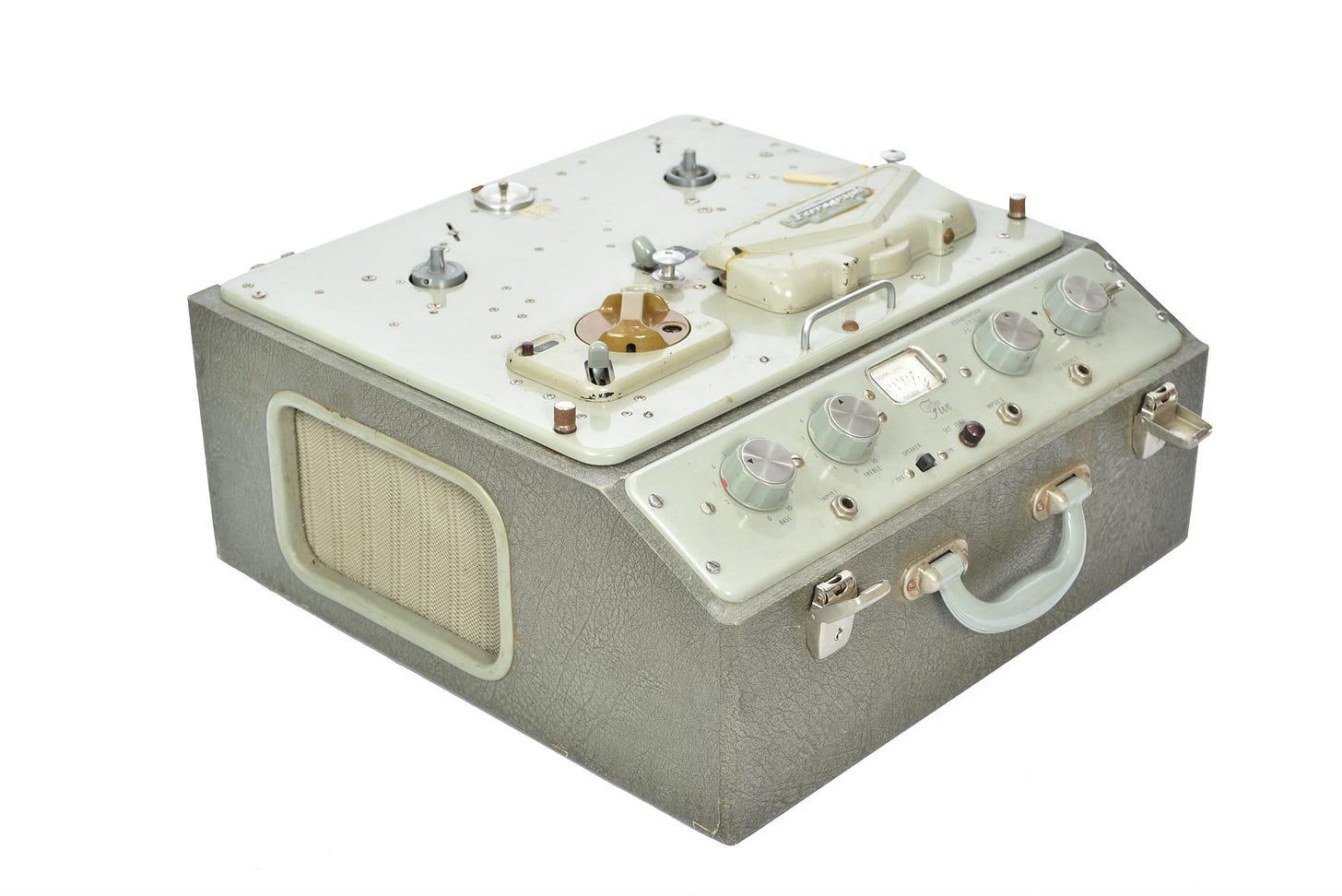Out of the blue, one more thing...
Memories triggered by Streeter, Beckett and Krapp's Last Tape

Reminded of remembering
A post from Jeffrey (@engliushrepublicofletters) Streeter, about Samuel Beckett's 1958 one-act play Krapp's Last Tape, reminds me of listening to it as an audio book on Audible and writing in one of the beautifully hand-bound large hard-backed notebooks that my step-daughter Holly gave me for my 60th birthday, that I had been using also to keep notes from a creative workshop run by composite eco-poet kin’d & kin’d (Kay Syrad and Clare Whistler) called 'Making Poemish', with the overall title 'Changing Everything Carefully' borrowed from e.e. cummings, sitting on my bed in the maxillofacial surgery recovery ward at Queen Victoria Hospital, East Grinstead, following a procedure to repair my cheek bone with titanium after a RTA collison with a Mini and a heavy fall onto the pavement when crossing a main road in Brighton while running, the incident that led to us not getting to New York to see Paul Simon's last concert, the incident for which I'm still not completely forgiven.
How’s that for a Jamesian paragraph?1
I’m reminded of:
Ye did run well; who did hinder you?
runs Galatians 5,vii, continuing,
that ye should not obey the truth?
I always forget that last phrase.
I look back at my notes and discover:
a) a wealth of draft material I've never used,
b) that I have made notes of some of the same quotations from Krapp's Last Tape that Jeffrey Streeter has in his post,
and c)mise en abyme is present in these notes and I realise again how recurrent a motif it is in my life and history.
Rocking and rolling
I've noted:
Listening to Krapp's Last Tape on my iPhone rock & rolling to find different sections, as he does
– Krapp goes back and forward on his reel to reel tape machine, just like the Ferrograph my father brought home one day that we used to record Alan Freeman's Sunday evening Pick of the Pops radio show. And I go back and forth 'rock and rolling' in my memory between events in different decades.
Krapp listens to his own voice.
Box 3. Spool 5.
Spool. Spool.
It is a fabulous word.
Revelled in the word ‘spool’. Spool.
Spoken as 'spoool' by Jim Norton, the narrator on the audio.
In Beckett's play it's 'A late evening in the future'. Bananas and their skins seem to have a symbolic and a clownish comedic significance.
I have swathes of pencilled notes. Krapp has recorded himself remembering notes he made earlier in his life, he laughs with his recorded laugh.
Did I sing as a boy? No. Did I ever sing? No.
Sneers at what he calls his youth and thanks to God that it's over. A false ring there.
A girl in a shabby green coat on a railway station platform.
Preceding these notes there are drafts for a sequence '30 for 30', a wedding anniversary present I was planning to give to another ‘girl on a station platform’, Rosy, who was at Liverpool Street in 1987, a year before we married. But here they lie as drafts, unfinished. Damn, that means 40 at 40. 37 at 37 doesn't have quite the same ring to it.
Drowned in dreams
Krapp begins recording a new tape.
Just been listening to that stupid bastard I took myself for thirty years ago. Hard to believe I was ever as bad as that. Thank God that's all done with anyway.
Everything there. Everything on this old muck ball, all the light and dark and famine and feasting of the ages. Yes! Let that go, Jesus! Take his mind off his own work. Jesus!
He remembers his own efforts at publication, checks a royalty statement.
Seventeen copies sold of which eleven at trade price to free circulating libraries beyond the seas. Getting known. One pound, six and something. Eight I have little doubt.
Ah, the poignancy of poetry pamphlets.
Drowned in dreams and burning to be gone.
Beckett’s revelation
On a brief visit to Dublin in 1945, Beckett had a revelation of his future approach to his writing.
I realised that Joyce had gone as far as one could in the direction of knowing more, [being] in control of one's material. He was always adding to it; you only have to look at his proofs to see that. I realised that my own way was in impoverishment, in lack of knowledge and in taking away, in subtracting rather than in adding.2
Precious ally
The Wikipedia article about Beckett continues:
Beckett fictionalised the experience in his play Krapp's Last Tape (1958). While listening to a tape he made earlier in his life, Krapp hears his younger self say ‘clear to me at last that the dark I have always struggled to keep under is in reality my most...’, at which point Krapp fast-forwards the tape (before the audience can hear the complete revelation). Beckett later explained to Knowlson that the missing words on the tape are ‘precious ally’.
Note to self
Beckett's style and triumphant mastery of technique made me write a note to myself:
'Examine every word.
Every preposition.
Every turn of phrase and turn of thought.
Turn again.
Twist and tear.'
Not that again!
Of course, mise en abyme is never far away when I’m scouting through research material. As Beckett’s Wikipedia article points out, the critic Vivian Mercier wrote that Beckett
has achieved a theoretical impossibility—a play in which nothing happens, that yet keeps audiences glued to their seats. What's more, since the second act is a subtly different reprise of the first, he has written a play in which nothing happens, twice.3
And…
Kaos on Netflix is well worth a watch, as is Slow Horses as ever, on Apple TV. And the hilariously bad Nightsleeper on BBC is a wonderful children’s thriller for grown-ups, so bad, it’s good!
Enjoy!
Talking of Howzat, Wikipedia points out that Samuel Beckett was a natural athlete. He ‘excelled at cricket as a left-handed batsman and a left-arm medium-pace bowler. Later, he played for Dublin University and played two first-class games against Northamptonshire. As a result, he became the only Nobel literature laureate to have played first-class cricket.’
Samuel Beckett, as related by James Knowlson in his biography Damned to Fame: The Life of Samuel Beckett (London: Bloomsbury, 1997) quoted in the the Wikipedia article about Beckett.
Irish Times, 18 February 1956, p. 6, quoted in the the Wikipedia article about Beckett.







